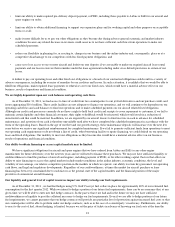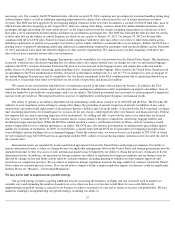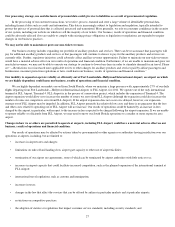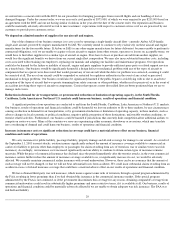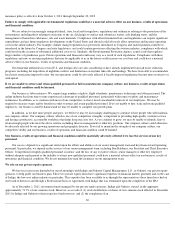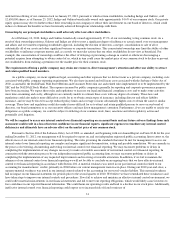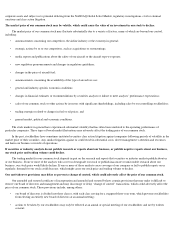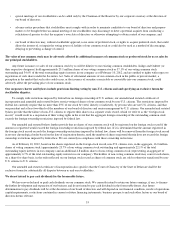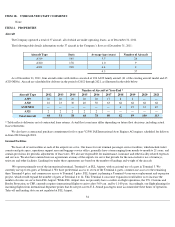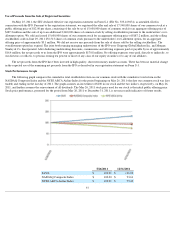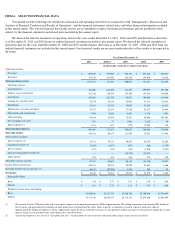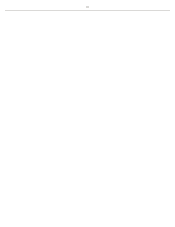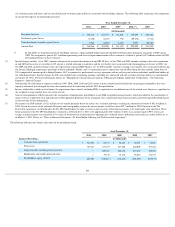Spirit Airlines 2011 Annual Report Download - page 36
Download and view the complete annual report
Please find page 36 of the 2011 Spirit Airlines annual report below. You can navigate through the pages in the report by either clicking on the pages listed below, or by using the keyword search tool below to find specific information within the annual report.
underwritten offering of our common stock on January 25, 2012, pursuant to which certain stockholders, including Indigo and Oaktree, sold
12,650,000 shares, as of January 25, 2012, Indigo and Oaktree beneficially owned only approximately 34.6% of our common stock. Our private
equity sponsors may elect to further reduce their ownership in our company or reduce their involvement on our board of directors, which could
reduce or eliminate the benefits we have historically achieved through our relationships with them.
Ownership by our principal stockholders could adversely affect our other stockholders.
As of February 10, 2012, Indigo and Oaktree beneficially owned approximately 37.1% of our outstanding voting common stock. As a
result of their ownership positions, Oaktree and Indigo are able to exert a significant degree of influence or actual control over our management
and affairs and over matters requiring stockholder approval, including the election of directors, a merger, consolidation or sale of all or
substantially all of our assets and other significant business or corporate transactions. This concentrated ownership may limit the ability of other
stockholders to influence corporate matters and, as a result, we may take actions that our other stockholders do not view as beneficial. For
example, this concentration of ownership could have the effect of delaying or preventing a change in control or otherwise discouraging a
potential acquirer from attempting to obtain control of us, which in turn could cause the market price of our common stock to decline or prevent
our stockholders from realizing a premium over the market price for their common stock.
The requirements of being a public company may strain our resources, divert management’s attention and affect our ability to attract
and retain qualified board members.
As a public company, we incur significant legal, accounting and other expenses that we did not incur as a private company, including costs
associated with public company reporting requirements. We also have incurred and will incur costs associated with the Sarbanes-Oxley Act of
2002, as amended, the Dodd-
Frank Wall Street Reform and Consumer Protection Act and related rules implemented or to be implemented by the
SEC and the NASDAQ Stock Market. The expenses incurred by public companies generally for reporting and corporate governance purposes
have been increasing. We expect these rules and regulations to increase our legal and financial compliance costs and to make some activities
more time-consuming and costly, although we are currently unable to estimate these costs with any degree of certainty. These laws and
regulations could also make it more difficult or costly for us to obtain certain types of insurance, including director and officer liability
insurance, and we may be forced to accept reduced policy limits and coverage or incur substantially higher costs to obtain the same or similar
coverage. These laws and regulations could also make it more difficult for us to attract and retain qualified persons to serve on our board of
directors, our board committees or as our executive officers and may divert management’s attention. Furthermore, if we are unable to satisfy our
obligations as a public company, we could be subject to delisting of our common stock, fines, sanctions and other regulatory action and
potentially civil litigation.
We will be required to assess our internal control over financial reporting on an annual basis and any future adverse findings from such
assessment could result in a loss of investor confidence in our financial reports, significant expenses to remediate any internal control
deficiencies and ultimately have an adverse effect on the market price of our common stock.
Pursuant to Section 404 of the Sarbanes-Oxley Act of 2002, as amended, and beginning with our Annual Report on Form 10-
K for the year
ending December 31, 2012, our management will be required to report on, and our independent registered public accounting firm to attest to, the
effectiveness of our internal control over financial reporting. The rules governing the standards that must be met for management to assess our
internal control over financial reporting are complex and require significant documentation, testing and possible remediation. We are currently in
the process of reviewing, documenting and testing our internal control over financial reporting. We may encounter problems or delays in
completing the implementation of any changes necessary to make a favorable assessment of our internal control over financial reporting. In
connection with the attestation process by our independent registered public accounting firm, we may encounter problems or delays in
completing the implementation of any requested improvements and receiving a favorable attestation. In addition, if we fail to maintain the
adequacy of our internal control over financial reporting we will not be able to conclude on an ongoing basis that we have effective internal
control over financial reporting in accordance with Section 404. A material weakness was noted in our past internal controls related to our
accounting for manufacturers’ credits, primarily in 2006 before our current management team was in place. During our 2010 year-end close, a
separate material weakness was noted in our internal controls related to the accounting for our travel voucher liability. This material weakness
had no impact on our financial statements for periods prior to the second quarter of 2010. We believe we have remediated these weaknesses and
have taken steps to improve our internal controls and procedures. If we fail to achieve and maintain an effective internal control environment, we
could suffer material misstatements in our financial statements and fail to meet our reporting obligations, which would likely cause investors to
lose confidence in our reported financial information. This could harm our operating results and lead to a decline in our stock price. Additionally,
ineffective internal control over financial reporting could expose us to increased risk of fraud or misuse of
31



